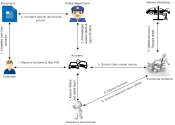An industry (from Latin industrius, "diligent, industrious") is the manufacturing of a good or service within a category. Although industry is a broad term for any kind of economic production, in economics and urban planning industry is a synonym for the secondary sector, which is a type of economic activity involved in the manufacturing of raw materials into goods and products.
There are four key industrial economic sectors: the primary sector, largely raw material extraction industries such as mining and farming; the secondary sector, involving refining, construction, and manufacturing; the tertiary sector, which deals with services (such as law and medicine) and distribution of manufactured goods; and the quaternary sector, a relatively new type of knowledge industry focusing on technological research, design and development such as computer programming, and biochemistry. A fifth quinary sector has been proposed encompassing nonprofit activities. The economy is also broadly separated into public sector and private sector, with industry generally categorized as private. Industries are also any business or manufacturing.
Industry in the sense of manufacturing became a key sector of production and labour in European and North American countries during the Industrial Revolution, which upset previous mercantile and feudal economies through many successive rapid advances in technology, such as the steel and coal production. It is aided by technological advances, and has continued to develop into new types and sectors to this day. Industrial countries then assumed a capitalist economic policy. Railroads and steam-powered ships began speedily establishing links with previously unreachable world markets, enabling private companies to develop to then-unheard of size and wealth. Following the Industrial Revolution, perhaps a third of the world's economic output is derived from manufacturing industries—more than agriculture's share.
Many developed countries (for example the UK, the U.S., and Canada) and many developing/semi-developed countries (People's Republic of China, India etc.) depend significantly on industry. Industries, the countries they reside in, and the economies of those countries are interlinked in a complex web of interdependence.









